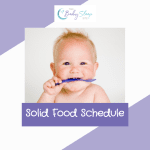
Reflux: it’s a problem that affects many babies (up to 50% of babies age 0-3 months!) And if your baby has ever struggled with reflux, you know how hard it can be — the gas, the vomiting, the constant fussiness.
Since reflux is a digestive issue, introducing solid foods to your baby will definitely have an impact on her reflux symptoms. Some parents find their babies’ reflux symptoms actually improve with the introduction of solid foods. Others find that starting solids increases reflux symptoms like gas and vomiting.
5 Tips For Feeding Babies With Reflux
Does your baby struggle with reflux? Below, we’ve included 5 tips to help you feed solid foods to your baby with reflux.
Offer good “first foods”.
Rice cereal is usually considered a good first food for babies without reflux, and it may be fine for a baby with reflux, too. However, rice cereal has been known to cause constipation and gas in some babies, so you may want to avoid offering it right away, if your baby has reflux.
Instead, consider starting with these foods:
- Avocado — Foods that are high in fat, like avocados, can be good for babies with reflux. Babies with reflux may eat less than babies without, so it’s considered good practice to offer them high fat, high calorie foods.)
- Pears — Pears are one of the least acidic fruits, and since acid can trigger reflux, pears make a great first food for your baby.
- Bananas — Bananas have been shown to actually help with digestion.
Avoid foods that are known to trigger reflux.
Foods that are known to cause gas can cause lots of pain and discomfort for a baby who already struggles with reflux. Those foods include:
- Onions
- Garlic
- Broccoli
- Cucumber
- Brussel sprouts
- Cabbage
- Cauliflower
- Corn
Other foods that have been known to increase reflux symptoms include:
- Dairy products (particularly milk)
- Acidic foods, like tomatoes and oranges
- High-fat meats
- Carbonated drinks (not that you should be offering those to your baby anyway! 😉 )
Stick to the 4 Day Rule.
Remember the 4 Day Rule? Essentially, the 4 Day Rule advises you to wait 4 days between introducing new foods to your baby. This allows you to figure out which (if any) foods your baby might be allergic to.
This rule works for babies with reflux, too. After you’ve offered your baby a new food, wait a few days to see if it triggers any reflux symptoms. This will make it much easier for you to uncover your baby’s “trigger foods” and keep those out of her diet as much as possible.
Offer frequent, small meals (but not too close to bedtime!)
Your baby will have an easier time digesting small quantities of food than larger ones. And for some babies, eating large meals triggers reflux symptoms. So consider creating your own daily feeding schedule that’ll include 4 or 5 (or even 6) small meals.
What’s more, avoid offering your baby any solids in the hour before bedtime. This will help ensure that if he does have any reflux symptoms after eating, they won’t interfere with his nighttime sleep.
Keep your baby upright.
If your baby’s struggled with reflux since birth, you probably know this one already. The fact is that keeping your baby in an upright position after feeding can actually help him digest food, and can help prevent vomiting. This is true for babies when they’re breastfeeding or bottle feeding; it’s also true for babies when they’re eating solid foods!
Sit babies upright when it’s time for a solids meal, and avoid laying them down flat on their backs (or their stomachs) after eating. It’s also recommended that you avoid placing your baby in a walker or exersaucer (or anything else that’ll put pressure on his stomach) after he’s eaten.
Everything You Need To Know About Starting Solids – All In One e-Book!
 What if you could find everything you needed to know about starting your baby on solid foods? When is it best to start solids, and how to introduce solids and handle complications and food allergies? We have it all in one easy-reference guide! Now you can have it all! Your Baby’s Start To Solid Foods: A Comprehensive Guide will walk you through every step of starting solids. Plus, your e-Book package includes several bonus materials, designed to maximize your success in starting solids. You’ll get a thorough guide to treating constipation, a dietitian’s advice on how to avoid 5 common solid food mistakes, and a weekly meal plan for your baby’s first year. Grab your e-Book today, and ensure your baby has the healthiest possible start to solid foods!
What if you could find everything you needed to know about starting your baby on solid foods? When is it best to start solids, and how to introduce solids and handle complications and food allergies? We have it all in one easy-reference guide! Now you can have it all! Your Baby’s Start To Solid Foods: A Comprehensive Guide will walk you through every step of starting solids. Plus, your e-Book package includes several bonus materials, designed to maximize your success in starting solids. You’ll get a thorough guide to treating constipation, a dietitian’s advice on how to avoid 5 common solid food mistakes, and a weekly meal plan for your baby’s first year. Grab your e-Book today, and ensure your baby has the healthiest possible start to solid foods!
*Some of this information was taken from homemade-baby-food-recipes.com.








